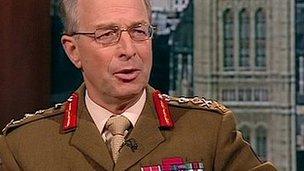Gen Sir David Richards: Economy biggest risk to UK
- Published

Gen Richards said the economy must be central to the UK's "grand strategy"
The biggest strategic risk facing the UK is economic not military, the head of the British armed forces has said.
General Sir David Richards said the UK's main effort must be the economy, as "no country can defend itself if bankrupt".
The eurozone crisis was of "huge importance" to military planners as well as the City, he said.
Despite defence cuts, Britain would remain "powerful relative to our allies", he added.
The chief of the defence staff said: "I am clear that the single biggest strategic risk facing the UK today is economic rather than military."
In a lecture to the Royal United Services Institute in London, he said a thriving economy must be central to the UK's "grand strategy".
"This is why the eurozone crisis is of such huge importance not just to the City of London but rightly to the whole country, and to military planners like me."
Gen Richards said the Strategic Defence and Security Review had "rebalanced" British defence and security for the next 10 years, and would still leave the country "powerful relative to our allies".
He said defence structures were changing in all Western countries and the UK would remain a "front rank player" in Nato.
Forming partnerships with other nations was vital he said, pointing out this had been crucial to the successful operation in Libya.
On Afghanistan, he said the operation was "on track", but warned of the dangers of the media drawing "wrong conclusions".
"Still the Taliban can play one card. They operate in the world of perceptions and convince many in the UK and elsewhere to see the operation as it was, not as it is," he said.
"Perception is lagging reality by some 18 months. While we are, like a chess player, planning three or four moves ahead we cannot signal our plans openly.
"That leaves the media frequently, and understandably, to look only at what has happened. They frequently draw the wrong conclusion."
- Published15 December 2011
- Published22 November 2010
- Published13 November 2011
- Published19 October 2010